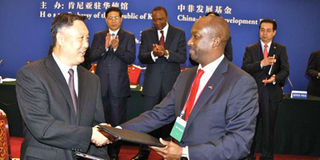Chinese loans useful for Kenya’s progress

President Uhuru Kenyatta and president of China Development Bank, Zheng Zhijie witness the exchange of the MoU between Kenya National Chamber of Commerce and Industry, National Chairman Kiprono Kittony and his counterpart from China Chamber of Commerce Machinery and Electronics after the signing ceremony during the Kenya-China Investment and Business Forum meeting in Beijing, China. PHOTO | XINHUA
What you need to know:
- China has actively assumed the responsibility of volunteering financial aid to African countries, including Kenya.
- Currently in Africa, Kenya ranks first among countries receiving China’s preferential loans.
- By the end of 2015, China’s Exim Bank had given Kenya 26 loans with lending rates far below the international market one.
- Collaboration between China and Kenya goes beyond loans and includes financial aid, bilateral trade, and investment.
Reports that loans from China would burden Kenyans for generations are sensational and patently untrue. The loans and projects will not bring any additional burden to Kenya, but should greatly boost economic and social development if well deployed.
China’s assistance is not structured to be exploitative, not only because of the long-standing friendship with Kenya dating back to the 15th century, but also because the development trajectory of the two countries is quite similar.
Three decades ago, China was in need of financing to support its economic and social development, just as is the case with Kenya today.
And as the world’s largest goods trader and second largest economy, China has actively assumed the responsibility of volunteering financial aid to African countries, including Kenya.
Although supported by a few developed countries, Kenya is still in need of more capital to hasten its development.
Since the Chinese Government is aware that Kenya has a good credit history, hard-working people, and a bright future, China has established a comprehensive and cooperative partnership with Kenya. Currently in Africa, Kenya ranks first among countries receiving China’s preferential loans.
By the end of 2015, China’s Exim Bank had provided 26 loans to Kenya, most with lending rates far below the international market one and with a longer grace period.
During this grace period, only interest is paid. The loans were for projects including those in transportation, electricity, healthcare, communications, geothermal, and youth empowerment. Some examples include the Olkaria project that has drilled 145 geothermal wells, increasing electricity generating capacity by 20 per cent.
STANDARD GAUGE RAILWAY
The standard gauge railway project, predicted to be the main engine for economic growth in the future, increased the growth rate of the construction sector to 13.6 per cent in 2015. It is currently providing 30,000 jobs, will reduce the cost of logistics by 40 per cent, and will encourage the market potential of the cross-boundary transportation industry.
The Thika highway and the 110 kilometres of the Nairobi Eastern, Northern, and Southern bypasses have eased traffic flow around the city. The Electricity Transmission Network Project in the coastal area is connecting residents to stable and reliable electricity supply.
The Garissa Solar Power Plant Project is intended to supply affordable electricity to 625,000 households and create 1,000 jobs. The National Remote Sensing and Aero Geological Survey Project will assist the Kenyan Government to explore the distribution and deposits of mineral resources.
By the end of 2015, the China Development Bank (CDB) had granted $273 million special loans to SMEs covering 29 sub-projects in 14 sectors. The interest rate for these loans is 65 per cent lower than the Central Bank of Kenya’s benchmark rate for SMEs.
In addition, CDB has committed a longer term preferential $600 million loan to Kenya’s National Treasury, whose interest is far below that of sovereign bonds and commercial lending. The money will be allocated to 151 projects in transportation and energy.
However, collaboration between China and Kenya goes beyond loans and includes financial aid, bilateral trade, and investment.
According to the World Bank, Kenya fell behind Uganda and Tanzania in attracting foreign direct investment, mainly because of rampant corruption, poor infrastructure, and a poor investment climate.
We hope that the business environment in Kenya will improve to attract more direct investment from China, which will, along with traditional contracting firms, boost the economic development of Kenya. We are confident about Kenya’s future.
Dr Guo Ce is the economic and commercial counsellor, Chinese embassy in Kenya.





